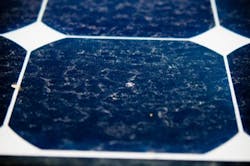Cleaning photovoltaic panels often not worth the cost, at least in California
San Diego, CA--Don't hire someone to wash your dirty photovoltaic (PV) panels, engineers at the University of California, San Diego (UCSD) advise. The reason: paying for a solar-panel washing would cost more than the energy it would save.
The UCSD researchers found that panels that had been neither cleaned nor rained on for 145 days during a summer drought in California dropped in efficiency by only 7.4%. Overall, for a typical residential solar system of 5 kW, washing panels halfway through the summer would translate into a mere $20 gain in electricity production until the summer drought ends in about 2½ months.
For larger commercial rooftop systems, the financial losses are bigger, but still rarely enough to warrant the cost of washing the panels. On average, panels lost a little less than 0.05% of their overall efficiency per day. The findings were published in the July 25 online issue of Solar Energy.
If very large, go ahead and wash
Jan Kleissl, the principal investigator on the study and a professor of mechanical and aerospace engineering at UCSD, cautions that the study is focused on smaller systems. For very large installations, economies of scale may mean that washing panels is worth it.
The researchers analyzed data from the California Solar Initiative showing solar panel output at 186 residential and commercial sites from the San Francisco Bay Area to the United States-Mexico border for the year 2010. They compared output after more than 0.1 in. of rain fell on the panels with output during the 145 day summer drought California experienced that year. The panels would have been cleaned by rain but would have remained dirty during the drought, researchers reasoned.
The survey's findings are applicable more widely, says Kleissl. Pollution and dust levels in California are fairly representative of the rest of the United States -- and possibly higher, he explained. If anything, other areas of the country get more rain, resulting in cleaner panels and even smaller losses. "Of course, there are exceptional events, like dust storms in Arizona," Kleissl says.
The researchers didn't find any statistically significant differences between different regions of the state for output during the drought period, although sites in the Los Angeles basin and the Central Valley had dirtier panels. A caveat: solar panels heavily soiled with bird droppings should be cleaned, because the droppings essentially block all sunlight and are not washed away when it rains.

John Wallace | Senior Technical Editor (1998-2022)
John Wallace was with Laser Focus World for nearly 25 years, retiring in late June 2022. He obtained a bachelor's degree in mechanical engineering and physics at Rutgers University and a master's in optical engineering at the University of Rochester. Before becoming an editor, John worked as an engineer at RCA, Exxon, Eastman Kodak, and GCA Corporation.
